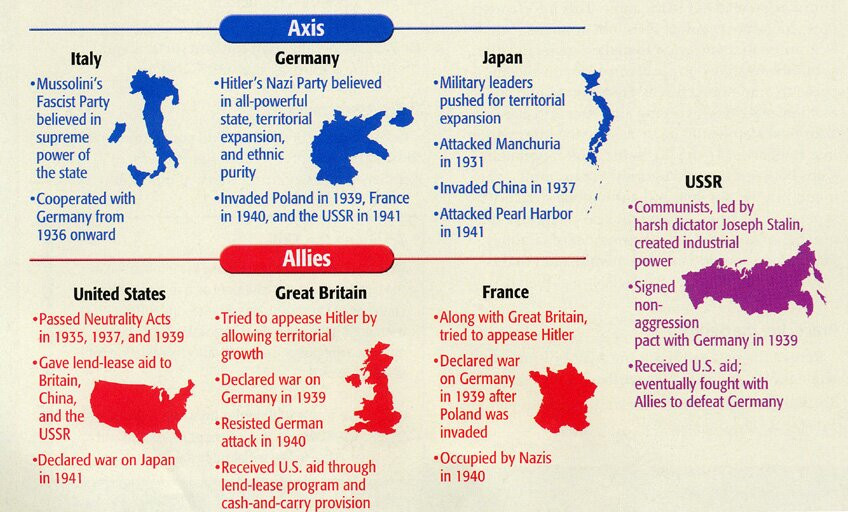-
Q. Examine the impact of the second World War on the development of the modern world, including the shift in global power dynamics and the emergence of new ideologies. (250 words)
09 Jan, 2023 GS Paper 1 HistoryApproach
- Start your answer with briefly explaining second world war.
- Discuss major impacts of second world war.
- Conclude accordingly.
Introduction
- The Second World War was a global conflict that took place between 1939 and 1945. Further, the conflict includes the Axis powers—Germany, Italy, and Japan—and the Allies—France, Great Britain, the United States, the Soviet Union, and, to a lesser extent, China.
- As the result of this conflict, almost 100 million people had been militarized, and 50 million had been killed (around 3% of the world's population).
Body
- The second world war had a profound and lasting impact on the development of the modern world. Further, it impacted the global power dynamics, political ideologies, and social and cultural developments of the post-war period.
- Impact of second world war on modern world:
- Shift in Global Power Dynamics:
- One of the most significant impacts of the Second World War was the shift in global power dynamics resulting from the conflict. Prior to the war, Europe had been the dominant global power, with countries like Britain, France, and Germany playing leading roles in international affairs. However, the devastation of the war, especially in Europe, led to a significant shift in the balance of power.
- Cold war:
- The United States and Soviet Union emerged as the dominant global superpower and major players on the global stage.
- It led to the spread of communism, with the Soviet Union playing a major role in shaping the political landscape of Eastern Europe.
- These ideological shifts lead to the rise of cold war between Soviet Union which was promoting authoritarianism and communism as the sole ideology for the world whereas USA was promoting liberalism, capitalism and free trade.
- Which further, led to the formation of two opposing military alliances, the Western-led North Atlantic Treaty Organization (NATO) and the Soviet-led Warsaw Pact.
- Decolonization:
- After the war, Britain and France were confronted with various domestic and external problems. Both of them could no longer hold onto their respective colonies Thus, the post-war world witnessed the end of colonialism in Africa and Asia.
- Establishment of United Nations:
- One of the momentous results of the war was the birth of the United Nations Organization.
- The UN Charter enshrines the hopes and ideals of mankind on the basis of which countries can work together to maintain lasting peace.
- However, the establishment of the UN was agreed, much before the end of World War II under the Atlantic Charter.
- Social and Cultural Developments:
- The war led to significant changes in the roles and expectations of women, as many women entered the workforce to take on traditionally male roles while men were away fighting.
- The war also had a major impact on the way that people thought about the role of government and the state, with the rise of the welfare state in many countries as governments sought to provide for the needs of their citizens.
- Economic Impacts:
- The economic impacts of the Second World War were also significant, both in the short term and the long term. In the short term, the war disrupted global trade and led to shortages of key resources, leading to economic hardship in many countries.
- In the long term, the war contributed to the development of the global economy as it stood at the beginning of the post-war period which eventually led to the New Economic World Order like:
- Establishment of the Marshall Plan by the USA, for example, provided significant economic assistance to European countries in the aftermath of the war, helping to rebuild their economies and lay the foundations for future economic growth.
- The Bretton Woods Conference established the International Bank for Reconstruction and Development (now known as the World Bank) to make long-term capital available to states in need of foreign aid, and the International Monetary Fund (IMF) to stabilize currency exchange rates. The General Agreement on Tariffs and Trade (GATT) also helped to reduce trade barriers and promote economic growth.
- Also, the US dollar was established as a reserve currency for the world trade.
- Shift in Global Power Dynamics:
Conclusion
In conclusion, the Second World War had a profound and lasting impact on the development of the modern world. It shaped the global power dynamics, political ideologies, and social and cultural developments of the post-war period and had significant economic impacts as well. The war continues to influence the world.
To get PDF version, Please click on "Print PDF" button.
Print PDF





